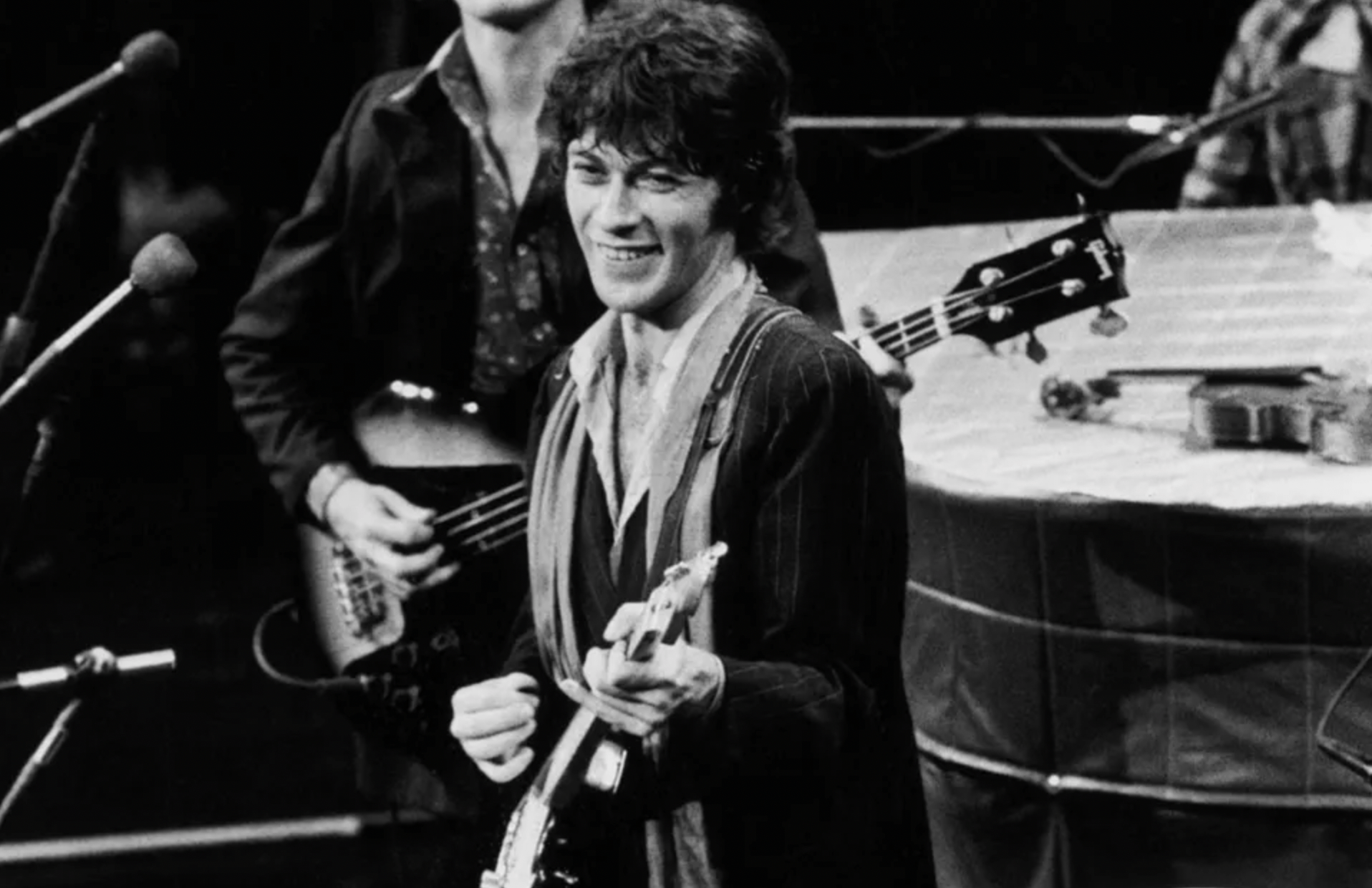RIP Robbie Robertson, the Canadian Who Brought Roots to Rock’n’Roll
 Robbie Robertson with the Band in 1976/AP
Robbie Robertson with the Band in 1976/AP
By Charlie Angus
August 10, 2023
As soon as the news surfaced on Wednesday that Robbie Robertson passed into the other world, my phone started pinging. Friends, colleagues, musicians; all were wanting to connect over the fact Canada and the world had lost a truly great artist. It seemed surreal — I had been on the internet earlier in the day searching out photographs of Robertson and the Band circa 1968.
My recent interest/obsession was the product of a late-night debate over wine and songs with some musician friends. We were arguing about the Band — something all bands do — with each of us taking sides in the legendary break-up of one of the greatest musical acts of the 20th century.
There are many artists who’ve had more hits and sold more discs but there are few who have had as enormous a cultural influence as the musical outlaws from Big Pink, the house in Upstate New York where the Band wrote Music from Big Pink, their 1968 debut album.
Soon after his passing, the New York Times obit eulogized Robertson as the “Canadian songwriter [who] captured the American spirit.” Miss Fanny, Carmen and the Devil hold their place in the American story alongside any characters conjured by Steinbeck, Hemingway or Flannery O’Connor. And in Acadian Driftwood the Band reminded us of our own troubled history in “the land of snow.”
But what made the Band unique was that the members themselves seemed like characters in a great cultural drama. There was the heartbreaking Rick Danko, rootsy Levon Helms, tragically beautiful Richard Manuel and the steady, brilliant and genuine Garth Hudson. The guy who kept it all together was, literally, the leader of the Band: Robbie Robertson combined the magnetism of Jagger with the artistic integrity of Dylan, wrapped in an understated aura of Canadian chill.
(When my band, the Grievous Angels, were were recording our latest album, Last Call for Cinderella, there was a lot of talk about the Band as our keyboardist, Alexandra Bell, was using a hammond B3 organ that had been graced by Garth Hudson. That’s as close as I may come to musical greatness.)
The Band first came to national prominence when they joined Dylan on his legendary electric tour of the UK. Night after night, they were booed for breaking the folk taboo of mixing the genre with loud rock’n’roll. Dylan called the Band his “gallant knights” for putting up with the abuse.
Miss Fanny, Carmen and the Devil hold their place in the American story alongside any characters conjured by Steinbeck, Hemingway or Flannery O’Connor. And in ‘Acadian Driftwood’ the Band reminded us of our own troubled history in ‘the land of snow’.
But then, few of those British folkies knew the backstory. Robertson was a Canadian kid who grew up in Toronto and on the Six Nations reserve near Brantford, Ontario, where his Mohawk mother was from. After learning to play the guitar from two Six Nations uncles, he went on the road at 17 to back up the wild rockabilly singer Ronnie Hawkins. Rock’n’roll touring has never been for the faint of heart and these teenage boys played some of the roughest juke joints imaginable. At various times, they called themselves the Hawks, the Crackers and the Canadian Squires. After a while people just started referring to them as “the band”. They were that good.
And so, by the time they were being heckled by university folkies in Britain, Robertson and the Band had seen it all. They had played to and won over much tougher crowds. “We didn’t budge,” he later said. “The more they booed the louder we got.”
The folkies didn’t get it – the Band and Dylan were in the process of creating something new and completely original. It was a home brew of influences – Indigenous, roots, southern, Canadian, soulful. There was nothing quite like it heard before.
 Big Pink, the house made famous by the Band in West Saugerties, NY/Jondan via Wikipedia
Big Pink, the house made famous by the Band in West Saugerties, NY/Jondan via Wikipedia
It all came together with the release of Music from Big Pink in 1968. There have been many albums that have sold way more but few have left such a massive footprint on the zeitgeist of an era. Countless musicians have imitated their sound and their look. An entire genre of music known as Americana can be traced back to what emerged from the basement of Big Pink in West Saugerties, New York.
The Band were at the height of their fame when Robertson decided to pull the plug and to move on to new projects. His last act with the Band was the powerful Martin Scorsese documentary The Last Waltz. It was like an Irish wake where the body is not only still breathing but unmistakably alive, kicking and raising hell.
Ask any music fan or musician how times they have watched The Last Waltz and they will likely not be able to tell you. I first saw it when I was 15 and was mesmerized by the sound and the look. Everything was authentic as it gets. That feeling certainty hasn’t diminished in the countless times I have seen it since. Like everything else about the Band and Robbie Robertson, it aged very well.
Robertson shines in the film. His charisma and skill are breathtaking to behold. What is powerful about the film is that he put this unique panorama together in order to close one chapter in his life and move on to another. There are those who never forgave him for having the chutzpah to do something so bold as to leave such a dynamic rock band. But the fascinating thing about Robertson is that he was always focused on moving forward.
My recent late-night debate with other musicians over who was the most soulful in the most soulful group was not just a nerd debate of music obsessives. The fact is that great characters in literature become archetypes for us to make sense of the world around us. There is Miss Bessie tearing up the winnings at the race track “just for a laugh.” There is Virgil Cain who tries to put his life back together after the terrible fratricide of the Civil War.
And there are Helms, Danko, Manuel, Hudson and the kid from Six Nations with a six-string guitar and a million-dollar smile.
Somehow, they remain characters in a grand, sweeping story of the second half of the American century, and in a more exclusively revered musical mythology.
That is a helluva legacy. Go to the angels Robbie. They’re waiting for you.
Policy Contributing Writer Charlie Angus is Member of Parliament for Timmins-James Bay. His band Grievous Angels have just recorded their 9th album, Last Call for Cinderella.
